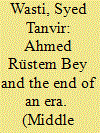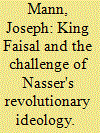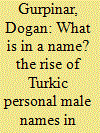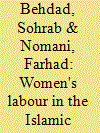| Srl | Item |
| 1 |
ID:
114872


|
|
|
|
|
| Publication |
2012.
|
| Summary/Abstract |
Ahmed Rüstem Bey was accredited as Ottoman Ambassador to the United States of America at a critical juncture before the First World War. The Ottoman Empire had weakened as a result of revolts by many minorities agitating for self-determination and a series of military conflicts culminating in the Balkan Wars. Ahmed Rüstem Bey, though born in Turkey of non-Turkish parentage, was a dyed-in-the-wool Ottoman who felt deeply attached to his country. As Ambassador his stay in the US was short and controversial. Information on Ahmed Rüstem's life and career needs augmentation, and the present article represents an initial attempt to portray this unconventional diplomat.
|
|
|
|
|
|
|
|
|
|
|
|
|
|
|
|
| 2 |
ID:
114869


|
|
|
|
|
| Publication |
2012.
|
| Summary/Abstract |
In recent years there has been much debate about whether the activities of missionaries were an act of religious altruism or a medium of cultural expansion and a preparation for political involvement. The American expedition occurred during the early years of modern Western - as yet mainly British, French and Russian - penetration of the Ottoman realms. The immediate effect was to draw the East into the rapidly expanding capitalist world economy while containing the ambitions of rival powers in order to prepare for the Sublime Porte's ultimate dismemberment. This phase of missionary activity represented something extraordinary, because the Americans were attempting to impose their kind of Christianity, namely, Protestantism, on communities which had been Christian well before the Christian American identity came into being. This article examines the formation of the American Protestant missionaries' activities in Anatolia; missionaries' evaluations of events within the Empire, and their relations with the Armenians will be the focus of the analysis. In other words, attention will be drawn to how the missionary enterprise fostered Armenian nationalism by introducing Western political ideals and promoting Armenian cultural identity through education and the press discussed. Rather than examining the Armenian Question, this paper will trace the genesis of Armenian nationalism through the Boards' Protestant Anatolia vision.
|
|
|
|
|
|
|
|
|
|
|
|
|
|
|
|
| 3 |
ID:
114873


|
|
|
|
|
| Publication |
2012.
|
| Summary/Abstract |
Serif Mardin, one of Turkey's most prominent sociologists, recently stated that 'there is a deep silence about the working class in Turkey'. This article will try to analyse the factors that cause this 'deep silence', which, paradoxically, is observed even by the competing Kemalist and Islamic political actors. In other words, the 'deep silence' refers to the common perspective on the working class of the otherwise different and competing groups. This can be called their solidaristic view, the purpose of which is essentially to provide solidarity among government officials, merchants and peasants that eventually formed the basis of European corporatism. Although it outlines the historical manifestation of the solidarist view, this paper focuses particularly on how Islamic actors maintain that view. This is a problem that requires the examination of various factors around a key question. How is it that competing groups are in harmony in the matter of their ideological positions on the working class?
|
|
|
|
|
|
|
|
|
|
|
|
|
|
|
|
| 4 |
ID:
114870


|
|
|
|
|
| Publication |
2012.
|
| Summary/Abstract |
The purpose of this article is to examine the relations between Egypt and Saudi Arabia from the time of King Faisal's rise to power until President Nasser's death, via various events that shaped the Middle East. The article will also examine the main points of disagreement between the two countries, as well as the threat to the stability of the Saudi regime posed by the Egyptian President during those years. Finally, the research will examine the influence of President Nasser's death on Saudi-Egyptian relations and on the Middle East in general.
|
|
|
|
|
|
|
|
|
|
|
|
|
|
|
|
| 5 |
ID:
114874


|
|
|
|
|
| Publication |
2012.
|
| Summary/Abstract |
Edward Said's idea is that intellectuals should be 'amateurs', in the French sense of the term, in order to be involved with knowledge production out of their passion and keen interest, rather than as a duty-bound job. This should generate excitement and create dedication in their explorations and activism in and out of their professional fields. Following this idea, I argue in this paper how Egypt's radical feminist, Nawal el Saadawi, a physician by profession but humanist by passion, became a key dissident figure inside her country and abroad. I discuss her writings and activism that contribute towards advancing social justice for all, especially repressed women under patriarchy. Further, I argue that Saadawi's writings take part in a Gramscian hegemonic war against power in order to assert non-coercive knowledge in opposition to power's discursive formation. In doing so, Saadawi is guided by her moral principles. The combination of these two aspects not only makes her a Saidian 'amateur' but also a voice of resistance to be reckoned with.
|
|
|
|
|
|
|
|
|
|
|
|
|
|
|
|
| 6 |
ID:
114867


|
|
|
|
|
| Publication |
2012.
|
| Summary/Abstract |
The article overviews the emergence and development of the nomenclature of nationalist Turkish male first names which had to a considerable extent superseded the traditional religiously motivated names and discusses the cultural and political background of this process. Demonstrating its "catastrophical success", the article contributes to the literature on the nationalization of private lives and spheres.
|
|
|
|
|
|
|
|
|
|
|
|
|
|
|
|
| 7 |
ID:
114868


|
|
|
|
|
| Publication |
2012.
|
| Summary/Abstract |
This article examines the changes in the female class structure of the urban work force in post-revolutionary Iran by investigating the rate and pattern of the exclusion and the incorporation of women in the market between 1976 and 2006. We examine the gender marginalization thesis and test it empirically by focusing on the class nature of women's exclusion and incorporation into the labour force. We rely on decennial census data and present our empirical finding in the context of the social hierarchy of work. Moreover, we provide a comparative empirical analysis of the economic marginalization process for urban women's and men's class locations historically.
|
|
|
|
|
|
|
|
|
|
|
|
|
|
|
|
| 8 |
ID:
114871


|
|
|
|
|
| Publication |
2012.
|
| Summary/Abstract |
This paper presents some related processes in Turkey which have been initiated or influenced by the World Bank's execution of the Social Risk Mitigation Project (SRMP). It argues that the Justice and Development Party (AKP), as a party that redefined social assistance as charity by incorporating Islamic values with neo-liberalism, benefited from the SRMP for increasing its public support. It also demonstrates how the AKP's use of this project for its political aims led to some unintended consequences, causing the production and spreading of discourses about the poor, the Kurdish population and the emergence of a culture of poverty in the country.
|
|
|
|
|
|
|
|
|
|
|
|
|
|
|
|